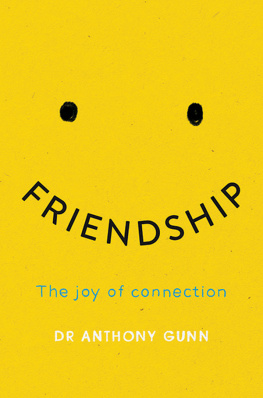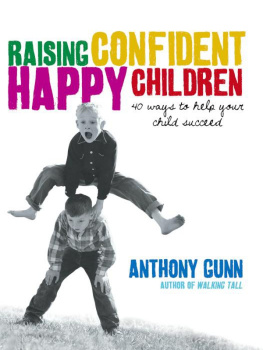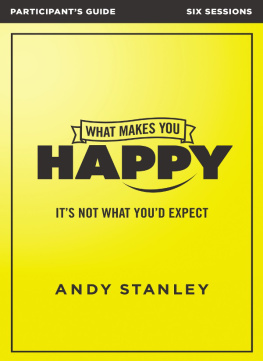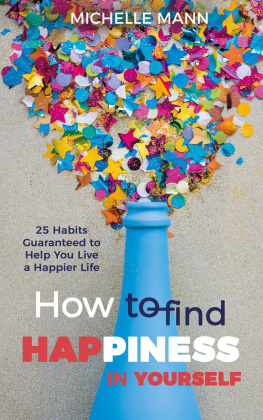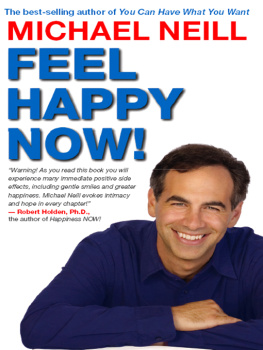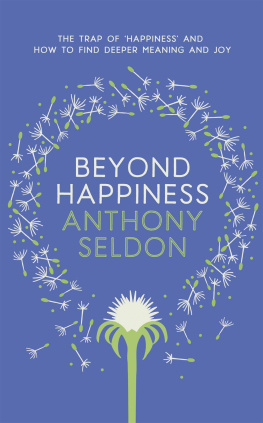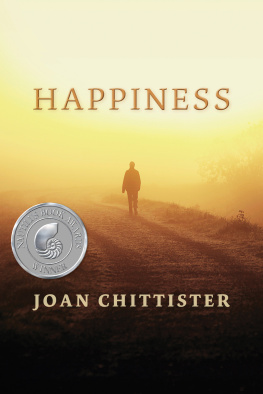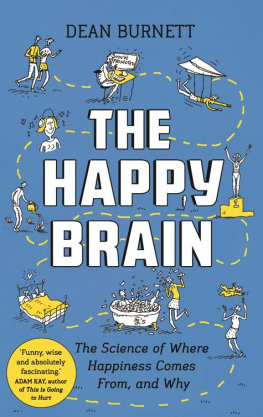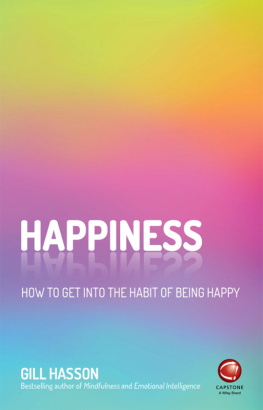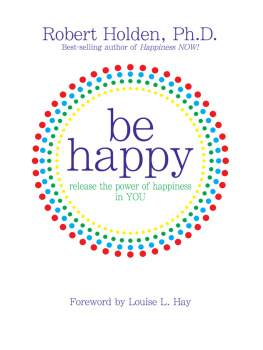Published in 2015 by Hardie Grant Books
Hardie Grant Books (Australia)
Ground Floor, Building 1
658 Church Street
Richmond, Victoria 3121
www.hardiegrant.com.au
Hardie Grant Books (UK)
5th & 6th Floor
5254 Southwark Street
London SE1 1UN
www.hardiegrant.co.uk
All rights reserved. No part of this publication may be reproduced, stored in a retrieval system or transmitted in any form by any means, electronic, mechanical, photocopying, recording or otherwise, without the prior written permission of the publishers and copyright holders.
The moral rights of the author have been asserted.
Copyright text Anthony Gunn
A Cataloguing-in-Publication entry is available from the catalogue of the National Library of Australia at www.nla.gov.au
Get Happy!
eISBN 978 1 74358 348 7
Cover design by Kinart
Author photo courtesy of Handprint Photography
Contents
To my brothers, Mick and Ian,
and my sister Kazz,
for always being there.

Can we really become happier or is happiness determined by our genes? Researchers have found that 50 per cent of our happiness is determined by genes and only 10 per cent by what happens to us in our lives. Amazingly, this means 40 per cent of our happiness is within our control. In spite of what you have inherited or what tragedies you have experienced in life, there are things you can do to increase your happiness. Continue reading to learn the lessons of lasting happiness.
The basic root of happiness lies in our minds; outer circumstances are nothing more than adverse or favourable.
MATTHIEU RICARD
Most of us in developed countries have all our basic needs met: food, shelter, hygiene, safety and education. So we have to rely on wants to make us happy, such as wanting a new car, new lounge, bigger TV, newer phone. Sadly, our wants will never make us happy in the long term because we dont need them to survive. Tap back into your basic needs. For example:
- Thirst: Do a physical challenge that causes you to develop a real thirst, and notice how good a drink of water tastes.
- Safety: Feel a buzz of exhilaration by taking a small risk, such as doing a difficult water activity or holding a tame snake at a zoo.
- Warmth: Have a cold shower in cold weather and then focus on getting warm.
Happiness is appreciating the things we most need.
Wealth consists not in having great possessions, but in having few wants.
EPICTETUS
Do you like chocolate? The first piece of chocolate will taste great, yet each subsequent piece will offer decreasing pleasure. Why? Its because we get used to things; in psychology, this is called habituation. You think youll be happy once you get that new car, renovated kitchen, polished floorboards or whatever, but the happiness wont last long because the novelty wears off. The result is that you need to buy another new object to try to increase your happiness again. Before buying a new non-essential object, ask yourself how long it will keep you happy.
An object in possession seldom retains the same charm that it had in pursuit.
PLINY THE YOUNGER
If habituation causes us to become used to things quickly, what is the answer to finding lasting happiness? Variety really is the best defence against habituation. A good way to practise this is by stepping out of your comfort zone, by trying a new sport, meeting new people, going to new places, learning a new skill or furthering your education. Every time you step out of your comfort zone, youre forced to grow as a person. Make yourself the focus of change instead of changing objects around you and watch your happiness rise.
Nothing builds self-esteem and self-confidence like accomplishment.
THOMAS CARLYLE
Research shows that a number of people who undergo elective cosmetic surgery still think they look ugly afterwards, regardless of their new appearance. Likewise, glamorous beauty contestants frequently obsess about not being pretty enough, and muscle-bound bodybuilders worry they should be more muscular. Want to be happy with your body? Instead of focusing on whats wrong with it and comparing yourself to others, focus on what your body can do. What things has your body allowed you to accomplish in life?
Your body is not a temple, its an amusement park.
Enjoy the ride.
ANTHONY BOURDAIN
A key feature of many types of mental health issues is that the suffering person is inflexible to change. Change is all around us. Simply by reading this book you will have changed. Instead of trying to fight the inevitable, embrace change one of the keys to happiness. Change doesnt have to be negative; it can offer variety, novelty, surprise and excitement. Try making small changes in your life: try a new fashion, rearrange the furniture in your home or office, try a new food, or skip for the fun of it. Once you get used to making small changes, bigger ones will seem possible. Go on, embrace change and become flexibly happy!
The key to sustained happiness, health, and longevity is flexibility.
EV DURN
You may think that a fashion model sporting a serious look is appealing to others, but research would say the opposite. A team from the University of Bern in Switzerland found that when people were asked to evaluate a face, what made the face appear attractive was the intensity of its smile. Evolutionary psychologists believe this is because when we smile we are indicating to others that we are healthy and free of illness. Whats more, smiling helps release the feel-good hormones dopamine and serotonin in the body, making us feel better. Try this experiment: for one whole day try smiling, especially if you are not feeling in the mood, and see what happens to your happiness.
Smile, its free therapy.
DOUGLAS HORTON
Researchers have found that regularly counting your blessings increases happiness. Try the experiment researchers used: for one week, set aside ten minutes each night before you go to bed to write down three things that went well that day. You have to physically write it down on paper or type it on your computer, instead of just doing the exercise in your head. Next to each positive event in your list, answer the question, Why did this good thing happen? The researchers found that not only did this make people happier, but the benefits lasted for six months. Give it a go!
Dont cry because its over. Smile because it happened.
DR SEUSS
How would you feel if you lost everything? I recently spoke with a gentleman, Gordon, who had just lost everything in a bushfire: house, business, workshop, cars, family photos, all gone. Yet, despite this tragedy, he remained optimistic and happy. How is this possible? Gordon said that when everything was taken by the fire, he was able to focus on what was most important in life, and it wasnt material objects. Instead, he said it was family, friends and reputations. Its sobering to imagine how wed react to losing everything we own. What are the most valuable things in your life?
The things you own end up owning you. Its only after you lose everything that youre free to do anything.


